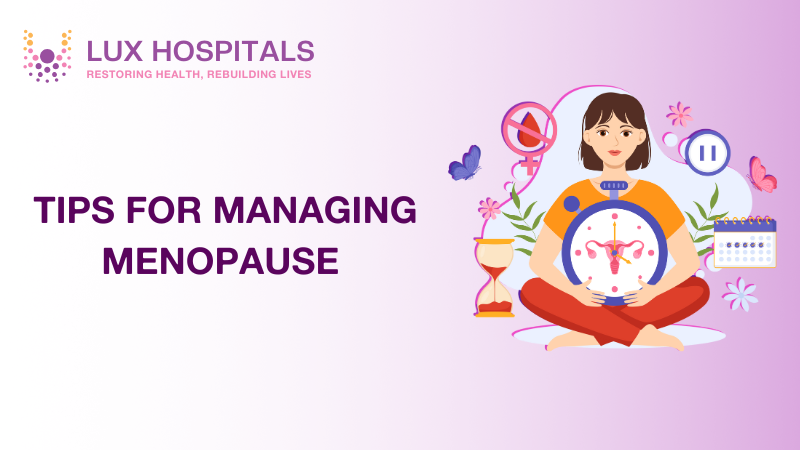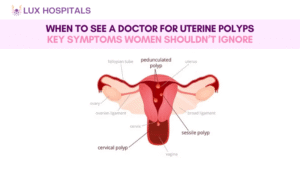How to Manage Menopause: Tips for Women

Menopause is the natural biological process that marks the end of a woman’s menstrual cycles, typically occurring in the late 40s or early 50s. Although it is a part of natural ageing, the transition can bring a variety of symptoms that may affect a woman’s physical and emotional well-being.
Understanding menopause, its symptoms, and treatment options can help a woman get through this phase more comfortably.
Understanding Menopause
Menopause is diagnosed when a woman has gone 12 months without a menstrual period. It marks the stage that closes the reproductive years, brought on by the declining production of hormones like estrogen and progesterone by the ovaries. The stages leading up to menopause, known as perimenopaus,e may similarly present with various symptoms due to fluctuating levels of hormones.
Common Menopausal Symptoms
Every woman’s experience is unique in terms of menopausal symptoms, but among all, most women suffer from one or other common signs described below:
- Hot Flashes: Sudden spasm of heat in the upper body accompanied by sweating.
- Night Sweats: Hot flashes at night affect rest.
- Mood Swings: Hormonal changes can make a woman moody, anxious, or even depressed.
- Sleep Disturbances: Trouble falling or remaining asleep.
- Vaginal Dryness: The reduced levels of estrogen result in dryness, resulting in painful intercourse
- Weight Gain: The changes in hormones during menopause add to the increase in weight, primarily around the stomach.
Signs Of Menopause
Women may seek the proper medical advice and treatment when they notice menopausal symptoms. Apart from the symptoms listed above, other signs of menopause include:
- Irregular Periods: A shift in the frequency or flow of menstrual cycles
- Decreased Libido: Reduced sexual drive
- Thinning Hair and Dry Skin: Hormonal changes can also cause changes in hair and skin texture
Menopause Treatment
Menopause symptoms can be treated using a combination of lifestyle changes, natural remedies, and medical treatments. Some of the common menopause treatments include:
1. Hormone Replacement Therapy (HRT)
Progesterone and estrogen are used in hormone replacement therapy (HRT). Which the body is no longer making. It is quite effective at relieving many Menopause symptoms, including vaginal dryness and hot flashes, but it may not be right for everyone. The risks and benefits should be discussed with a healthcare provider.
2. Non-Hormonal Medications
Women who cannot or do not wish to take hormones can try non-hormonal medications like antidepressants, which relieve mood swings and hot flashes.
3. Lifestyle Changes
- Diet and Exercise: A proper exercise regime coupled with a proper diet assists well in maintaining menopause weight gain and aids in better health.
- Stress Management: Activities such as yoga, meditation, and deep breathing can help manage stress and improve mood.
- Sleep Hygiene: A regular sleep schedule and a sleep-conducive environment can decrease disruptions in sleep.
Menopause Supplements
Many women turn to menopause supplements to manage symptoms naturally. While supplements can be helpful, it is essential to choose the best menopause supplements and talk with a healthcare provider before starting any new regimen. Common supplements include:
- Black Cohosh: Often used to reduce hot flashes and night sweats.
- Calcium and Vitamin D: Important for bone health, as the risk of osteoporosis increases after menopause.
- Omega-3 Fatty Acids: Supports mood swings and heart health.
- Hot Flash Help: Easing hot flashes naturally
Weight Management During Menopause
Most women gain weight during menopause; it may be due to changes in hormones, a decrease in metabolism, and lifestyle reasons. Here are some tips for managing weight during menopause:
- Eat a Balanced Diet: Emphasize whole foods, lean proteins, fruits, vegetables, and whole grains. It will also help to reduce processed foods and sugars.
- Regular Exercise: Both aerobic and strength training exercises boost metabolism and maintain muscle mass.
- Mindful Eating: It makes a person pay more attention to hunger signals and eat slowly to avoid overeating.
Achieving Menopause Weight Loss
For those seeking to shed weight gained during menopause, it’s all about consistency. Here are menopause weight loss strategies:
- Set Realistic Goals: Plan for slow and steady weight loss through changes in your lifestyle.
- Stay Active: Engage in activities that you enjoy and that keep you motivated be that walking, swimming, or yoga.
- Monitor Progress: Keep an account of your activities related to food intake and exercise to find what works best for you.
Additional Tips on Menopause
- Stay Hydrated: Drinking plenty of water can help manage bloating and keep skin hydrated.
- Seek Support: Joining support groups or talking with friends going through similar experiences can provide emotional support.
- Regular Health Checkups: Seeing a doctor on a regular basis helps to track changes in health and promptly address any issues.
Conclusion
Menopause is a significant life transition that presents its own challenges and opportunities. Understanding menopause symptoms, treatments, and supplements can help women navigate this phase meaningfully. A healthy lifestyle, managing menopause-related weight gain, and focusing on well-being can make the journey more positive.
At Lux Hospitals, we offer expert gynecologists, well-equipped instruments, and modern infrastructure to support women through this transition. Always consult with a healthcare provider to develop a personalized plan tailored to your individual needs and health goals.
Frequently Asked Questions
Supporting women through menopause involves encouraging healthy lifestyle choices, discussing medical options like hormone therapy, providing emotional support, and promoting regular health check-ups.
Hormone Replacement Therapy (HRT) is a safe and effective treatment for most women experiencing menopause and perimenopause. It involves using estrogen to replace the body’s declining levels around the time of menopause. Your healthcare provider will discuss any associated risks with you.
Menopausal symptoms vary widely among individuals. Some women experience minimal to no symptoms, while others may face severe symptoms that impact daily activities and quality of life. These symptoms can persist for several years.
Consult your healthcare provider if menopausal symptoms, such as hot flashes, irregular periods, or sleep disturbances, significantly impact your daily life. They can offer guidance on symptom management and overall health during this transition
To book an appointment for menopause treatment at Lux Hospitals in Hyderabad, you can visit their official website and navigate to the appointment section, or call their helpline at 07969084444. Lux Hospitals boasts a team of expert gynecologists specializing in women’s health, equipped with advanced instruments and modern infrastructure to provide comprehensive care.




















